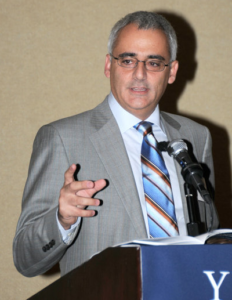A network of Islamist entities—some with documented ties to Hamas and other terror groups—has successfully embedded itself in Canada’s political, financial, academic, and civic institutions, according to a report from a major American think tank, the Institute for the Study of Global Antisemitism and Policy (ISGAP).
The Canadian government’s direct funding of organizations with known links to the Muslim Brotherhood and Hamas is not only a betrayal of public trust, it represents a serious national security failure.
Titled We Stand on Guard for Thee? The Growing Influence of the Muslim Brotherhood on Politics, Academia, and Civil Society in Canada, the report warns that these groups, often operating under the guise of religious or charitable organizations, pose a growing threat to Canadian democracy, civil society, and, by extension, U.S. national security.
“This report is a wake-up call for all Canadians,” Dr. Charles Asher Small, Founding Director of ISGAP, stated in a press release. “The Canadian government’s direct funding of organizations with known links to the Muslim Brotherhood and Hamas is not only a betrayal of public trust, it represents a serious national security failure.”
The report reveals how these groups have benefitted from millions of dollars in federal grants, even as they promote radical ideologies and antisemitic narratives. According to ISGAP, these organizations have weaponized Canada’s pluralist values to legitimize extremist agendas under the veneer of social services, religious outreach, and educational programming.
Brotherhood’s Influence Worsens Amid Surge in Antisemitism
The Brotherhood’s ideological grip on Canadian institutions and society became apparent following the October 7, 2023 Hamas terror attacks in Israel, ISGAP reports. University campuses, in particular—such as McGill and Concordia—have become epicenters of anti-Israel activism and radical rhetoric, driven in part by student groups and off-campus organizations linked to Brotherhood ideology. A dramatic 670 percent spike in antisemitic incidents nationwide, a 488 percent surge in terrorism charges in the past year, and the federal government’s callous approach to the threat of Islamist extremism—all indicate the significant inroads the Brotherhood has made in Canada.
The ISGAP report traces the roots of this phenomenon and offers a comprehensive analysis of how these ideologies flourished across Canadian institutions for years, largely unchallenged. It names six key organizations—some still receiving federal support despite their known extremist links: the Muslim Association of Canada (MAC), Islamic Relief Canada (IRC), Arab Medical Union (which no longer operates in Canada), Islamic Society of North America (ISNA)-Canada, the National Council of Canadian Muslims (NCCM), and the now-defunct International Relief Fund for the Afflicted and Needy (IRFAN-Canada). The latter was officially designated a terrorist organization in Canada in 2014 for transferring C$14.6 million to Hamas.
A 2024 Middle East Forum report identified four of these Islamist organizations—namely, MAC, IRC, ISNA-Canada and NCCM—collectively received in excess of $40 million in taxpayer funds from 2018 to 2022.
Foreign Influence and Financial Vulnerabilities
Equally troubling is the report’s documentation of Qatar’s expanding footprint in Canada. Through academic partnerships, religious endowments, and energy-sector investments, Qatar has funded several organizations now under scrutiny. Entities such as Qatar Charity and Eid Charity—both linked to U.S.-designated terrorist financing networks like the “Union of Good”—have funnelled millions into Canadian institutions, effectively supporting Brotherhood-affiliated activities.
The implications of these financial networks are far-reaching. Canada’s increasingly lax oversight of foreign-funded NGOs and religious organizations has not only undermined domestic security but also exposed vulnerabilities in its financial systems.
For instance, the U.S. Treasury Department issued a criminal indictment against TD Bank in October 2024, alleging that the Canadian financial system had “actively [enabled] extremist violence.” TD was levied a $3 billion penalty, making it the largest bank in American history to plead guilty to conspiracy to commit money laundering. The cross-border nature of this activity underscores the need for tighter cooperation between U.S. and Canadian law enforcement and financial regulatory bodies.
Political Legitimacy for Radical Networks
Despite growing evidence of extremist ties, many of these organizations continue to enjoy legitimacy and access to Canadian political leaders. Last month, Canadian Prime Minister Mark Carney appeared at an Eid al-Adha event hosted by the Muslim Association of Canada where he controversially remarked: “These are Muslim values. These are Canadian values.”
Such high-profile appearances only serve to legitimize groups that deserve closer scrutiny—not state endorsement.
A Call for Action
In the report, ISGAP urges Canada to designate the Muslim Brotherhood a terrorist organization—a move long advocated by security experts but thus far avoided due to political sensitivities and fears of alienating Muslim voters. Without decisive action, the report warns, Canada risks not only domestic radicalization and antisemitic violence but also becoming a strategic hub for international extremist networks seeking to infiltrate the United States.
In an email response to FWI, Small said, “The infiltration of the Muslim Brotherhood poses a serious and growing threat to national security—not only within individual countries—but across borders. Canada and the United States need to collectively consider how Brotherhood-affiliated organizations are able to infiltrate civil, academic, political and financial institutions in their respective countries. From money laundering to the spread of extremist ideologies, these organizations are a threat. ISGAP is calling on government leaders on both sides of the border to implement lasting and meaningful policy change, including designating the Muslim Brotherhood a Terrorist Organization, in an effort to protect our shared democratic values and collective security.”
As the U.S. grapples with its own domestic security threats, its northern neighbor’s growing entanglement with Islamist networks is no longer a distant concern—it’s a clear and present danger. Will the Trump administration crack the whip on the Carney government to prevent the Muslim Brotherhood from accomplishing their “grand jihad” plans for North America?



